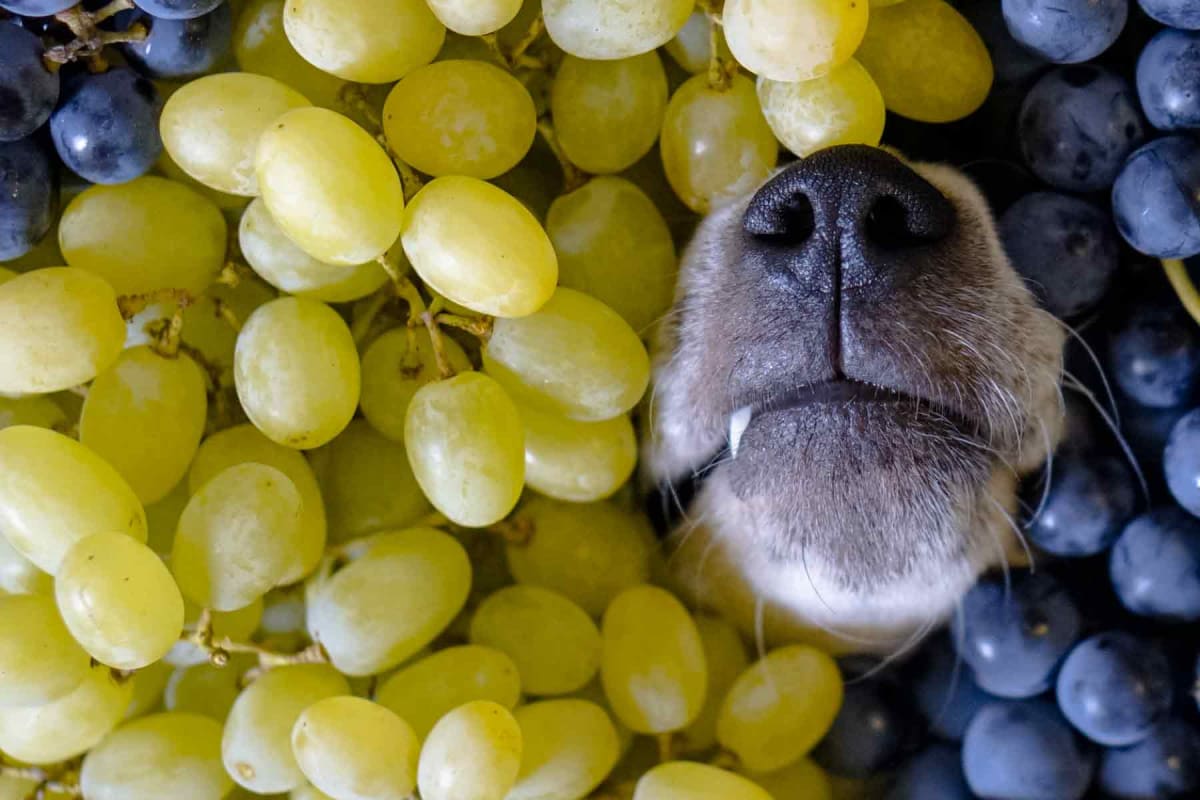
Can dogs eat grapes?
Can dogs eat grapes?
Can dogs eat grapes?
Can dogs eat grapes? The short answer is no. Grapes are highly toxic to dogs, regardless of breed, age, or gender. This toxicity can lead to severe health complications, including kidney failure and even death. Read on to dive deeper into why grapes are dangerous for dogs and what you should do if your furry friend accidentally consumes them.
Can dogs eat grape leaves?
It's unclear whether grape leaves alone are dangerous for dogs, but there's enough uncertainty that most veterinarians recommend avoiding them. Because the grape itself is toxic, anything related to the grapevine may carry similar risks. When in doubt, choose dog-safe fruits and vegetables instead of taking a chance on grape leaves.
Why are grapes bad for dogs?
Grapes contain a substance that is toxic to dogs, although scientists haven't pinpointed the exact compound responsible. Dogs cannot metabolize certain components found in grapes, such as tannins, flavonoids, and monosaccharides. This inability to process these substances is the primary cause of grape toxicity in dogs.
Recent research suggests that tartaric acid, found in grapes and grape leaves, could be the culprit behind the toxicity. This acid affects the taste, smell, and quality of wine, and it may be what makes grapes harmful to our canine companions.
Are grapes poisonous to dogs?
Yes. Grapes rank among the most toxic fruits for canines. The poisoning can be unpredictable, varying from mild stomach upset to life-threatening illness. Some dogs show symptoms within hours, while others take longer.
Because no safe threshold exists, veterinarians caution that dogs should not eat grapes in any form—fresh, frozen, cooked, dried, or peeled. This includes all types of grapes, including red, green, and seedless.
How many grapes will make a dog sick?
The exact number of grapes that can make a dog sick varies depending on the dog's size and individual sensitivity. However, it's important to note that even one grape can potentially be harmful. Always err on the side of caution and keep all grape products out of your dog's reach.
What about raisins?
Even more concentrated than whole grapes, raisins are just as dangerous, if not more so, for dogs. Foods like raisin cookies or trail mix containing raisins should always be out of reach. If your dog ingests raisins, treat it as an emergency and contact a vet immediately.
Signs of grape poisoning in dogs
If your dog has consumed grapes, it's essential to be aware of the symptoms of grape poisoning. These signs typically develop within 24 hours of ingestion and can include:
Vomiting
Diarrhea
Lethargy
Loss of appetite
Increased thirst
Excessive urination
Abdominal pain
Weakness
In severe cases, symptoms of kidney failure may appear 24 to 48 hours after grape consumption. These can include:
Decreased or no urine production
Dehydration
Mouth ulcers
High blood pressure
Seizures
Uremic breath (fishy odor)
If you notice any of these symptoms and suspect your dog has eaten grapes, seek veterinary care immediately.
What to do if your dog eats grapes
If you catch your dog in the act of eating grapes or suspect they've consumed some, call your vet or an emergency animal clinic immediately. Explain what your dog ate and how much. Do not induce vomiting unless directed by a professional. Quick action can make a big difference in successful treatment and outcome.
Remember, time is of the essence when dealing with grape toxicity. The sooner you seek help, the better the chances of a positive outcome for your pet.
How do veterinarians treat grape poisoning?
Treatment for grape toxicity in dogs depends on how quickly the dog receives care. Veterinarians may:
Induce vomiting or administer activated charcoal
Provide IV fluids to support kidney function
Monitor vital signs and urine output
Perform blood tests to assess kidney health
In severe cases, more intensive treatments such as dialysis may be necessary. The prognosis depends on how quickly they receive treatment and the severity of the poisoning. Prompt veterinary attention improves the chances of recovery.
How to prevent grape poisoning in dogs
Prevention is always better than cure when it comes to grape toxicity in dogs. Follow these tips to help keep your furry friend safe:
Store grapes, raisins, and grape products out of your dog's reach.
Educate family members and guests about the dangers of feeding grapes to dogs.
Be cautious with foods that might contain grapes or raisins, such as trail mix or baked goods.
Consider removing grape plants from your garden if you have a dog.
Always supervise your dog during meals and snack times.
For an occasional food treat, stick to safe fruits for dogs, such as blueberries, bananas, and watermelon (seedless).

Other toxic fruits
While grapes are particularly dangerous, there are other fruits that dogs should not eat. These include:
Cherries
Avocados
Star fruit
Citrus (in large amounts)
Unripe tomatoes
The pits and seeds of any fruit
This toxic fruit list is not exhaustive, and there are many other human foods that dogs should never eat, such as chocolate, onions, garlic, xylitol (sugar substitute), and alcohol. Always research and consult with your veterinarian before introducing any new foods to your dog's diet.